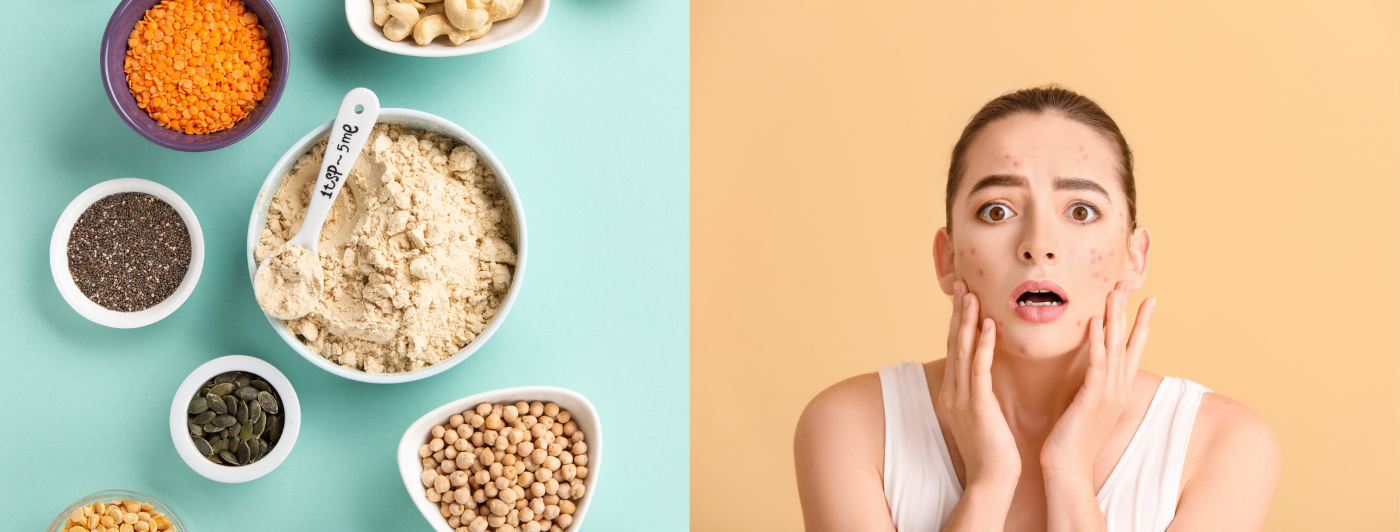Want firmer skin, stronger hair, and fewer wrinkles—without relying on expensive creams or supplements? The secret might already be in your kitchen. The foods you eat can play a far greater role in how youthful you look and feel than most people realize.
Collagen is the most abundant protein in the human body, comprising nearly 30% of total protein mass. It acts as the structural scaffold for your skin, bones, cartilage, tendons, and ligaments. But as you age, your body produces less of it—leading to visible signs like fine lines, sagging skin, joint stiffness, and hair thinning.
That’s why adding Collagen Rich Foods—along with collagen-boosting nutrients from both animal and plant protein sources—is one of the most effective, science-backed ways to support your body’s natural collagen production and preserve cellular strength and elasticity from within.
Why Focus on Collagen Rich Foods?
Collagen forms the foundation of your skin, bones, ligaments, and connective tissues. But collagen is not just something you apply topically—it’s something your body makes using amino acids and nutrients found in food. And that’s where Collagen Rich Foods come into play.
By including them in your diet, you can improve skin texture, reduce fine lines, increase hydration, and promote elasticity. These foods also work synergistically with vitamins and minerals like vitamin C, zinc, and sulfur to enhance collagen synthesis.
Let’s now explore the top 10 powerhouse foods that can help you turn back the clock—naturally.
Top 10 Collagen Rich Foods

1. Bone Broth
Bone broth is one of the most concentrated natural Collagen Rich Foods, containing types I, II, and III collagen. It’s made by simmering animal bones, tendons, and ligaments for 12–48 hours, releasing gelatin—a broken-down form of collagen—along with key amino acids like glycine, proline, and hydroxyproline, all essential for collagen structure and stability.
Studies show that gelatin-rich diets can enhance skin elasticity, hydration, and dermal density. Bone broth also delivers chondroitin sulfate and glucosamine, compounds critical for joint support and cartilage regeneration.
Tip: For best results, opt for slow-cooked, grass-fed versions—or make your own using marrow bones, chicken feet, and knuckles to extract the full spectrum of nutrients that make bone broth one of the most effective Collagen Rich Foods available.
2. Salmon
Salmon, especially when eaten with the skin, is a powerful source of marine collagen—mainly type I collagen, the most abundant form found in human skin. As one of the top Collagen Rich Foods from the sea, salmon offers a dual benefit: direct collagen intake and nutrients that protect existing collagen structures.
Additionally, salmon is rich in omega-3 fatty acids, which help reduce inflammatory markers like IL-6 and TNF-α—both known to accelerate collagen degradation. Regular intake is associated with improved collagen density, skin hydration, and a visible reduction in fine lines and wrinkles.
3. Eggs
Eggs don’t contain collagen directly, but they play a vital role in supporting your body’s ability to produce it. Rich in proline, lysine, and sulfur—three essential building blocks—eggs help fuel the internal processes that synthesize collagen.
In the presence of vitamin C, proline and lysine are converted into hydroxyproline and hydroxylysine, forming the stable triple-helix structure of collagen fibrils.
Egg yolks also supply biotin (vitamin B7), crucial for keratin production and skin repair, while the eggshell membrane—often used in supplements—is a natural source of collagen types I, V, and X.
Nutrition Insight: A whole egg delivers 6–7 grams of high-quality protein, along with key micronutrients that make it a valuable companion to other Collagen Rich Foods in your daily diet.
4. Chicken
Chicken—particularly the skin, joints, and bones—is rich in type II collagen, which is known for supporting cartilage, ligaments, and connective tissue. This form of collagen plays a significant role in reducing joint pain and improving flexibility, especially in athletes and older adults.
Chicken-derived collagen also contains hyaluronic acid and chondroitin, both of which support extracellular matrix integrity in the skin and joints. Many hydrolyzed collagen supplements in the market are extracted from chicken sternum cartilage for this reason.
5. Plant-Based Proteins
Although plant foods don’t naturally contain collagen, they can supply the amino acids and cofactors required to build it. Lentils, chickpeas, quinoa, hemp seeds, and soy-free options like pea protein powder offer a well-balanced amino acid profile.
Combining plant based protein powder with vitamin C-rich fruits enhances collagen synthesis even further. If you’re following a vegetarian or vegan diet, this is a vital strategy for boosting collagen naturally.
Use a protein intake calculator to ensure you meet your daily protein targets, as inadequate protein is a leading cause of collagen and tissue loss.
6. Citrus Fruits
Citrus fruits like oranges, lemons, limes, and grapefruits may not contain collagen themselves, but they are essential allies to Collagen Rich Foods. That’s because they’re loaded with vitamin C, a critical nutrient required for hydroxylation—the chemical process that stabilizes and cross-links collagen molecules into their strong, triple-helix structure.
Without sufficient vitamin C, your body can’t effectively synthesize or maintain collagen, leading to weaker skin, delayed healing, and increased signs of aging.
In addition, citrus fruits offer powerful flavonoids that help prevent UV-induced collagen breakdown, further preserving skin elasticity.
Bonus: Citrus flavonoids are also known for their photoprotective effects, helping to reduce hyperpigmentation and visible signs of sun damage. Pairing citrus with Collagen Rich Foods enhances your body's natural collagen-building potential.
7. Leafy Greens
Dark leafy vegetables like kale, spinach, and Swiss chard are indirect yet powerful contributors to collagen health. They contain chlorophyll, which has been shown in some studies to boost procollagen levels in the skin when consumed consistently.
These greens are rich in vitamin A, vitamin C, and antioxidants, all of which are crucial for skin regeneration, collagen stability, and protection against environmental damage.
As part of a well-rounded intake of Collagen Rich Foods, leafy greens enhance your body’s ability to produce collagen naturally—especially valuable for those following plant-based diets.
They also offer high-quality plant protein when consumed in combination with legumes or grains.
Added Benefit: Packed with lutein and zeaxanthin, they help shield your skin from blue light exposure and oxidative stress—key factors in premature aging.
8. Pumpkin Seeds
Pumpkin seeds are tiny but mighty when it comes to skin health. They’re packed with zinc, magnesium, and omega-3 fatty acids—nutrients that play a critical role in collagen metabolism and skin repair.
Zinc, in particular, is essential for collagen remodeling, immune regulation, and wound healing. A deficiency can lead to delayed skin regeneration, increased acne, and a breakdown in structural proteins.
As one of the most potent zinc rich foods, pumpkin seeds help inhibit matrix metalloproteinases (MMPs)—enzymes responsible for breaking down collagen and elastin in the skin.
Including them regularly alongside other Collagen Rich Foods can provide comprehensive support for maintaining firm, youthful skin.
Just 30g delivers over 25% of your daily zinc requirement, making them a simple yet powerful addition to your daily diet.
9. Almonds
Almonds are one of the best vitamin E foods for hair and skin. Vitamin E functions as a lipid-soluble antioxidant, protecting cell membranes and collagen fibers from oxidative stress caused by UV rays, pollution, and aging.
Almonds also offer healthy monounsaturated fats that contribute to supple skin and improved moisture retention. These benefits, along with their protein content, make almonds a great daily addition to a collagen-supportive diet.
You can also include peanut and groundnut in moderation—both are high in niacin and resveratrol, nutrients that support skin barrier function.
10. Tomatoes
Tomatoes are one of the most effective plant-based allies to support your skin’s collagen network. They’re a rich source of lycopene, a powerful antioxidant that protects collagen from UV-induced degradation and oxidative stress.
Studies show that regular consumption of lycopene can increase skin density and reduce wrinkle depth, making tomatoes a smart addition alongside other Collagen Rich Foods.
They also contain vitamin C, which is essential for collagen synthesis, and beta-carotene, which converts into vitamin A to support healthy skin turnover.
Red vegetables like tomatoes, beets, and carrots also promote melanin production, making them excellent melanin foods for even-toned, resilient skin.
Pro Tip: Cooking tomatoes boosts lycopene bioavailability by up to 4 times compared to raw—amplifying their collagen-protective benefits.
Supporting Nutrients to Boost Collagen Efficacy
While the Collagen Rich Foods above are the foundation of your anti-aging diet, these supporting nutrients further enhance their effectiveness:
-
Vitamin D Rich Foods in India: Fortified plant milks, mushrooms exposed to sunlight, and sesame seeds offer valuable sources. Adequate vitamin D levels are essential for skin health and collagen gene expression.
-
DHT Blocker Food: Pumpkin seeds, flaxseeds, green tea, and berries are known DHT blockers, helping prevent hair follicle shrinkage and promoting scalp health—a vital part of a youthful appearance.
Final Thoughts
Youthful skin isn’t built in a bottle—it’s built in the kitchen. By prioritizing Collagen Rich Foods, you're giving your body the nutrients it needs to produce and protect collagen naturally.
Start with just a few of these foods. Stay consistent. Use a protein intake calculator to hit your daily needs. And if you follow a plant-based diet, clean sources like Plantigo’s plant protein can help you meet essential amino acid requirements that support collagen synthesis—without compromising on quality.
What you eat today shapes how you look and feel tomorrow. Build your skin from within. Start now.
Frequently Asked Questions
1. What are Collagen Rich Foods?
Collagen Rich Foods are foods that either contain collagen directly—like bone broth and salmon—or provide the nutrients your body needs to produce collagen, such as vitamin C, zinc, and amino acids.
2. Can I get collagen from vegetarian foods?
Yes, while plant foods don’t contain collagen, they offer nutrients like proline, glycine, and vitamin C that support collagen production. Lentils, leafy greens, and pea protein powder are excellent options.
3. How often should I eat Collagen Rich Foods?
Including 2–3 Collagen Rich Foods daily can support your body’s natural collagen synthesis. Consistency is key, especially when combined with a balanced diet and healthy lifestyle.
4. Is collagen good for hair and joints too?
Yes, collagen supports the structure of hair follicles and joint cartilage. Regular intake can reduce joint pain and improve hair thickness, especially when paired with other DHT blocker foods.
5. Do I need supplements if I eat Collagen Rich Foods?
Not necessarily. A diet rich in whole foods—like eggs, citrus, chicken, and plant-based protein—can provide what your body needs. Supplements may help if your diet lacks variety or you're recovering from injury or aging rapidly.












